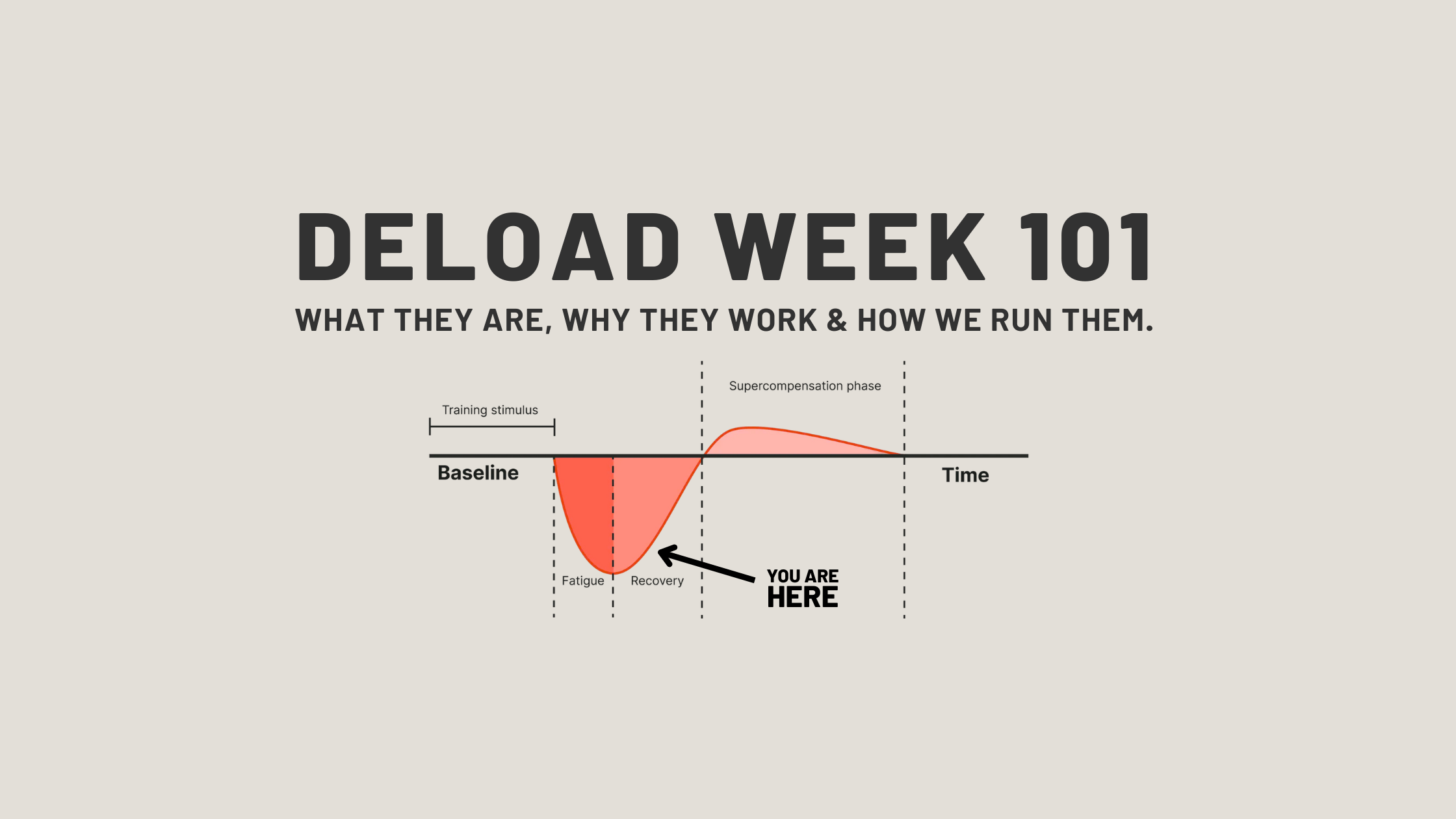

Deload Week 101: Why Training Less Can Make You Stronger
TL;DR
A deload week is a short, planned break where we lower weights and reps so your body can recover faster than it loses fitness. That way, you come back fresher, stronger, and sharper.
Deloads are built right into the programming at the gym. All you need to do is show up, move well, and follow your coach’s lead.
What Is a Deload Week (and Why It Works)
Think of training like this:
- Hard workouts = progress + fatigue (muscle soreness, joint stress, nervous system fatigue).
- Fatigue fades faster than fitness. If you ease up for a week, the tiredness drops but your fitness stays.
- That creates supercompensation — you bounce back stronger than before.
👉 Translation: A deload week isn’t “going backwards.” It’s the fastest way to push forward.
Who Needs a Deload (and How Often)
Most people benefit from a deload every 4–8 weeks, or after a test/peak phase.
You might need one earlier if you notice:
- Motivation drops – training feels like a chore
- Performance stalls – lifts feel stuck or slow
- Soreness that won’t go away – especially in shoulders, elbows, hips, or back
- RPE creep – weights that used to feel like a 7/10 now feel like a 9/10
- Poor recovery – bad sleep, higher resting HR, or low HRV if you track
💡 Pro tip: If any of this sounds like you, just tell your coach. We’ll adjust on the spot.
How We Run Deloads In-Gym
We don’t guess. Deloads are programmed in advance and your coach will guide you.
Strength (lifting)
- Work at RPE 6–7 (leave 2–4 reps in the tank)
- Do fewer sets (2–4 instead of 4–6)
- Use tempo or pauses to build technique
Conditioning (cardio/workouts)
- Shorter workouts
- Keep effort at RPE 6–7 (you should be able to talk while moving)
- Smooth, steady pace – no hero sets
Skill work
- 10–15 minutes practice
- Crisp reps only – stop before fatigue ruins form
Accessory work
- Focus on prehab and stability (shoulders, trunk, single-leg)
- Light, snappy movements
📌 Typical deload: Volume down 20–40%, Load down 10–15% if needed.
Beginners vs. Consistent Lifters
If you’re newer or train less often:
- Keep 2–3 reps “in the tank” on main lifts
- Try a micro-deload: drop 10–15% weight for one session, focus on clean technique, then go back up next week
If you’re consistent (4–5x/week):
- Plan a 1-week deload every 4–8 weeks
- Follow the gym’s built-in settings: lower weights, lower volume, higher focus on skill
Sample Deload Week (Monday–Saturday)
- Mon: Press 3×5 @ RPE 6–7 (slow lowering), 10-min easy bike, scap circuit
- Tue: Front squat 3×3 with pauses, Zone 2 row, ankle/hip prep
- Wed: 12 min skill work (kipping + strict pull-ups), light EMOM pace
- Thu: RDL 3×6 @ RPE 6–7, carries, light 10-min cardio
- Fri: 3 short pieces @ RPE 6–7, long rest between
- Sat: Partner Zone 2 circuit, mobility finisher
How to Tell If Your Deload Worked
- Workouts feel easier at the same weights
- Better sleep & more energy
- Less soreness & fewer hot-spots
- Motivation comes back – you want to train again
- (Optional: If you track data – lower HR at same pace, or faster bar speeds at same load)
Nutrition, Mindset & Lifestyle During a Deload
Nutrition
- Protein: 0.7–1.0 g per lb bodyweight
- Calories: Stay around maintenance
- Water: 2–3L/day (add electrolytes if you sweat a lot)
Mindset
- Think of it as practicing perfect form, not slacking off
- Write one line in a journal: “What felt smoother today?”
Lifestyle
- Sleep: 7.5–9 hours/night
- Mobility: 8–12 min/day
- Walking: 6–10k steps/day – light movement helps recovery
Common Mistakes to Avoid
❌ Ego lifting – testing PRs during deload week
❌ Cutting volume but cranking intensity – defeats the point
❌ Skipping skill work – this is the highest ROI piece
❌ Skipping the gym entirely – we want less, not none!
FAQs
Do I need to plan my own deload?
Nope. We build it into the programming. Your coach will scale for you.
How often should I deload?
Usually every 4–8 weeks, or after a big testing phase.
Will I lose gains?
Not at all. You actually gain more because you’re removing fatigue.
Call to Action
👉 Members: Your deload is already programmed—just show up and move well. Coaches will guide everything.
👉 Not a member yet? Book your free discovery call and we’ll build your training cycle—including deloads—around your goals.



